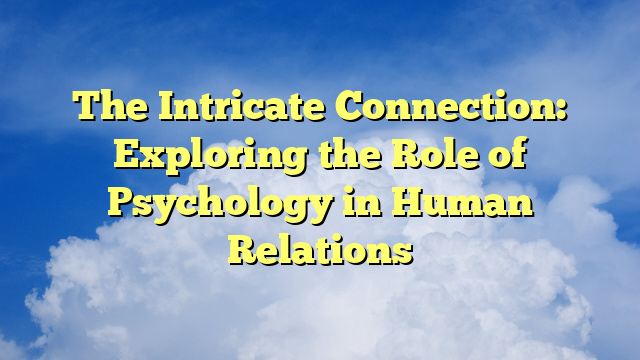The Intricate Connection: Exploring the Role of Psychology in Human Relations
The Intricate Connection: Exploring the Role of Psychology in Human Relations
The Importance of Psychology in Understanding Human Relations
Human relations are complex and multifaceted, influenced by a myriad of factors such as personality, upbringing, and social environment. To truly comprehend the intricacies of human relations, it is essential to delve into the realm of psychology. Psychology, the scientific study of the mind and behavior, provides valuable insights into the underlying mechanisms that shape our interactions with others.
By examining psychological theories and concepts, we can gain a deeper understanding of why individuals behave the way they do in various social contexts. This knowledge can be applied to improve communication, resolve conflicts, and foster healthier relationships.
The Role of Personality in Human Relations
One of the fundamental aspects of psychology that greatly influences human relations is personality. Personality refers to the unique set of traits, behaviors, and patterns of thought that define an individual. It plays a crucial role in shaping how we perceive and interact with others.
Psychologists have developed various theories to explain personality, such as the Big Five model, which identifies five broad dimensions of personality: openness, conscientiousness, extraversion, agreeableness, and neuroticism. Understanding these dimensions can help individuals recognize and appreciate the diversity of personalities they encounter, leading to more empathetic and effective communication.
The Impact of Social Psychology on Human Relations
Social psychology explores how individuals’ thoughts, feelings, and behaviors are influenced by the presence of others. It examines phenomena such as conformity, obedience, and group dynamics, shedding light on the intricate mechanisms that shape human relations in social settings.
For example, the concept of social norms highlights the unwritten rules and expectations that govern our behavior in different social contexts. By understanding these norms, individuals can navigate social situations more effectively, avoiding potential conflicts and misunderstandings.
Additionally, social psychology emphasizes the power of persuasion and influence. By studying techniques such as persuasion, individuals can enhance their ability to communicate effectively, negotiate, and resolve conflicts in a constructive manner.
The Role of Cognitive Psychology in Human Relations
Cognitive psychology focuses on how individuals perceive, process, and interpret information. It explores cognitive processes such as attention, memory, and problem-solving, which are crucial in understanding human relations.
For instance, cognitive biases, such as confirmation bias or the halo effect, can significantly impact how we perceive and judge others. By being aware of these biases, individuals can strive for more objective and fair assessments, leading to improved relationships.
Cognitive psychology also emphasizes the importance of empathy and perspective-taking. By understanding others’ thoughts, feelings, and perspectives, individuals can foster empathy and develop stronger connections with those around them.
Applying Psychological Insights to Enhance Human Relations
Psychological insights can be applied in various ways to improve human relations. Here are some practical strategies:
- Active Listening: Actively listening to others, without interrupting or judging, can foster better understanding and empathy.
- Conflict Resolution: Applying negotiation and problem-solving techniques can help resolve conflicts in a constructive manner.
- Emotional Intelligence: Developing emotional intelligence, which involves recognizing and managing one’s emotions and understanding others’, can lead to more harmonious relationships.
- Building Trust: Trust is a crucial component of healthy relationships. By being reliable, honest, and maintaining confidentiality, individuals can build trust with others.
The Future of Psychology in Human Relations
As our understanding of psychology continues to evolve, its role in human relations will become increasingly significant. Advancements in fields such as neuroscience and social cognition will provide further insights into the complexities of human behavior and relationships.
Moreover, the integration of technology and psychology holds immense potential for enhancing human relations. Virtual reality simulations, for example, can be used to develop empathy and perspective-taking skills, allowing individuals to experience different perspectives and cultures.
Conclusion
Psychology plays a vital role in unraveling the intricate connection between individuals and their relations with others. By exploring concepts from personality, social, and cognitive psychology, we can gain valuable insights into human behavior and improve our interactions with others.
Applying psychological insights in practical ways, such as active listening, conflict resolution, and emotional intelligence, can lead to healthier and more fulfilling relationships. As psychology continues to advance, its impact on human relations will only grow, paving the way for a more empathetic and interconnected society.

